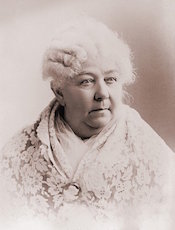
Elizabeth Standon
*Elizabeth Cady Stanton was born on this date in 1815. She was a white-American feminist and abolitionist.
Elizabeth Cady, the eighth of 11 children, was born in Johnstown, New York, to Daniel Cady and Margaret Livingston Cady. Five of her siblings died in early childhood or infancy. Her father was a prominent Federalist attorney who served one term in the United States Congress (1814–1817) and later became both a circuit court judge and, in 1847, a New York Supreme Court justice. Judge Cady introduced his daughter to the law and planted the early seeds that grew into her legal and social activism with her brother-in-law, Edward Bayard.
Slavery did not end in New York State until July 4, 1827, and, like many men of his day, Stanton's father was a slave owner. Peter Teabout, a slave in the Cady household later freed in Johnstown, cared for Stanton and her sister Margaret. While she does not mention Teabout's position as a slave in her family's household, Stanton remembers him with particular fondness in her memoir, Eighty Years & More.
When Elizabeth Cady married abolitionist Henry Brewster Stanton in 1840, she'd already observed enough about the legal relationships between men and women to insist that the word obey be dropped from the ceremony. As an active abolitionist herself, Stanton was outraged when the World's Anti-Slavery Convention in London, also in 1840, denied official standing to women delegates, including Lucretia Mott. In 1848, she and Mott called for a women's rights convention in Seneca Falls, New York. That convention and the Declaration of Sentiments written by Stanton, which was approved there, are credited with initiating the long struggle for women's rights and suffrage.
Stanton and Mott resolved to hold a women's rights convention when they returned to the United States. 1848 the first such convention was held in Seneca Falls, New York, where Stanton lived. The Declaration of Sentiments that Stanton drafted for the convention enumerated eighteen legal grievances suffered by women, including lack of the franchise and the right to their wages, their person, and their children. It also called attention to women's limited educational and economic opportunities.
In 1851, Stanton met Susan B. Anthony. For the next fifty years, they worked in close collaboration, Stanton articulating the arguments for improving women's legal and traditional rights and Anthony organizing and campaigning to achieve these goals. Elizabeth Cady Stanton died in New York on October 26, 1902, nearly 20 years before the United States granted women the right to vote.